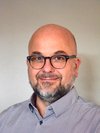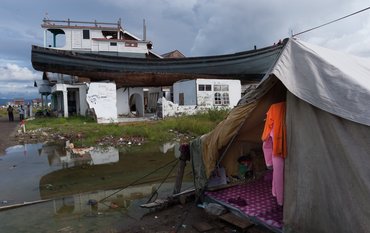Funded through an ERC Synergy Grant, Thomas Walter's ROTTnROCK project investigates the internal “rotting” of volcanoes, while Jens Kallmeyer's Archean Park project investigates the metabolic processes of primordial microbes under high CO2 concentrations.
Thomas Walter and Jens Kallmeyer, two scientists from the GFZ German Research Centre for Geosciences, have each received a prestigious ERC Synergy Grant. A total of almost six million euros will go to the GFZ for the two funded projects. This is the second time after 2019 that the GFZ has been successful in this EU funding line in a double pack. With “Synergy Grants”, the European Research Council (ERC) funds particularly ambitious research projects that lie at the interface of different disciplines and therefore require the cooperation of different research teams. Only about nine percent of the funding proposals submitted in the current round were approved – in total, the ERC awarded 37 Synergy Grants today.
Thomas Walter, working group leader in Section 2.1 “Earthquake and Volcano Physics” and professor at the University of Potsdam, convinced the jury with his project proposal “ROTTnROCK” on internal decay processes of volcanoes. He will lead the project together with three colleagues from Sweden, Ireland and France. The project will run for 6 years and will be funded with a total of 10 million euros, of which 2.65 million euros will go to the GFZ.
Jens Kallmeyer, working group leader in Section 3.7 “Geomicrobiology”, is one of four leading scientists in the successful project proposal “Archean Park”. The project will provide insights into the life and metabolism of microorganisms on the primordial Earth 4 to 2.5 billion years ago. The main lead of the project lies with Ivan Berg from the University of Münster, the other group leaders are Alexander Probst from the University of Duisburg-Essen and Kai-Uwe Hinrichs from the University of Bremen. The project will run for 6 years and will be funded with a total of 11.5 million euros, of which 3.3 million euros will go to the GFZ.
Brandenburg's Minister of Science Manja Schüle praises the double success:
Not just one, but two awards: The European Research Council awarded two top scientists from the Potsdam GeoForschungsZentrum with this year's 'ERC Synergy Grants' – one of the most important and coveted European research prizes. I warmly congratulate Thomas Walter and Jens Kallmeyer on this outstanding success! Their excellent research work, their achievements and competencies have convinced the jury and are an asset for Brandenburg as a science location. Thomas Walter is investigating rock changes in volcanoes, Jens Kallmeyer is involved in the Archean Park project, which is studying metabolic processes of primordial microbes under high CO2 concentrations – exciting, spectacular research topics that also excited the European Research Council and show once again: Science in Brandenburg is excellent!”
GFZ Executive Director Susanne Buiter also congratulates:
“I am very happy for Thomas Walter and Jens Kallmeyer and their teams about this extraordinary success! This is also a recognition of the GFZ as a team player, because the double success shows: At our centre, we create conditions for excellent and relevant research. Both Synergy Grants are about preserving a safe planet worth living on: A better understanding of elementary natural forces as well as fundamental microbial processes under extreme conditions and in the distant past are essential for this. And this requires diverse scientific perspectives, such as those brought together by an ERC Synergy Grant.”
To the projects
ROTTnROCK – Thomas Walter
In his project ROTTnROCK, Thomas Walter and his colleagues will investigate how volcanoes rot from the inside due to heat and aggressive chemical processes. “This so-called hydrothermal alteration changes the strength and permeability of the rocks. We therefore suspect this to be one of the main reasons why unexpected eruptions and entire flank collapses still occur despite scientific and technical advances in the monitoring of volcanoes,” says project leader Thomas Walter. The researchers want to understand the process of hydrothermal alteration in detail, monitor it with innovative drones and satellite sensors, simulate and analyse it in the laboratory and incorporate it into numerical prediction models. “Our research will also help to develop an innovative and optimised hazard assessment workflow.”
Background
More than 10 per cent of the world's population is at risk from the direct effects of volcanic eruptions. Volcano monitoring aims to detect and correctly interpret volcanic hazards and provide early and accurate warnings of impending eruptions. But despite technical and scientific advances, volcanoes still experience unexpected explosive eruptions or sudden flank collapses. Every year, such unpredictable events lead to volcanic disasters that devastate unprepared communities and destroy unprotected infrastructure.
Previous work by the researchers involved suggests that volcanic hazards are caused by what is known as hydrothermal alteration: It gradually and imperceptibly changes the chemical and physical state of the rock inside a volcano, creating a soft and unstable - or “rotten” - interior. How this change in the permeability and strength of the rocks is related to the hitherto unpredictable volcanic events, however, is a mystery.
The project in detail
The ROTTnROCK project aims to make groundbreaking progress in understanding the hydrothermal alteration processes that occur inside active volcanic systems. Specifically, the teams aim to find out where and at what scales alteration takes place, explore the chemical fingerprint of alteration and the effects on rock properties and strength using laboratory methods, and develop 4D simulations of volcanic stability and thus an innovative and optimised hazard assessment workflow.
The ROTTnROCK project combines innovative approaches from traditionally different geoscience disciplines (remote sensing, mineralogy and chemistry, rock mechanics and modelling).
“This project will revolutionise our understanding of hydrothermal alteration and its impact on volcanic hazard, paving the way for strategies to predict and mitigate unexpected volcanic events caused by hydrothermal alteration and prevent catastrophes at volcanoes worldwide,” say the researchers.
Planned contribution of the GFZ
The research group at GFZ will conduct precise surveys and analyses of the structure and topography of volcanic landscapes using satellite and drone remote sensing, and compare them with geophysical data. Satellite radar and stereo data help to monitor deformations of alteration zones. Drones provide the necessary resolution to track the intensity, type and spatial gradation of alteration. This allows for pinpoint sampling. The rock samples are then measured in terms of their composition and mechanical properties in the laboratories of the partner institutes.
Organisational
The four-member winning team includes Thomas Walter (GFZ), who is in charge, Valentin R. Troll (Uppsala University, Sweden), Michael J. Heap (Strasbourg Institute of Earth & Environment (ITES), France) and Claire E. Harpett (UCD School of Earth Sciences, University College Dublin, Ireland).
The project will run for six years, with funding totalling 10 million euros, of which 2.65 million euros will go to the GFZ.
Archean Park - Jens Kallmeyer
In the Archean Park project, researchers aim to gain insights into life on the primordial Earth and uncover previously unknown metabolic pathways that enabled microorganisms to live 4 to 2.5 billion years ago. “We will shed new light on the earliest forms of carbon fixation by determining the extent to which extremely high CO2 concentrations influenced early cellular biochemistry and microbial carbon cycling. To this end, we will study subterranean ecosystems such as mofettes, fumaroles and geysers, which, with their particularly high CO2 content, serve as an analogue for the archaean biosphere, which also functions under high CO2 conditions. And with our GFZ expertise, we will also create high-pressure conditions in the laboratory, such as those that prevail under the extreme conditions in the deep subsurface,” says Jens Kallmeyer.
The result will not only open up new perspectives on fundamental biochemical mechanisms and their role in the evolution of microbial life. The project will also promote biotechnological and geotechnological innovations, with potential applications in the field of CO2 storage, for example.
Background
At the beginning of the Earth's history, in the Archean Eon, conditions were completely different from today: the Earth's atmosphere contained no oxygen, but a lot of carbon dioxide (CO2). Nevertheless, there were living organisms that could cope with it: The first microorganisms built biomass from CO2 and presumably used chemical energy to do so – and not light like today's plants. The researchers suspect that CO2-rich underground ecosystems still harbour microorganisms today that prefer or even require extremely high CO2 concentrations. Relics of the old metabolic pathways may also still exist in various already known microorganisms, are no longer active – but can possibly be reactivated by appropriate external conditions.
There is growing evidence that extremely high CO2 concentrations favour energetically efficient CO2 fixation pathways, which immensely affects the carbon cycle.
The project in detail
The researchers will study microbial life in CO2-rich subsurface environments and elucidate ancient metabolic pathways that have been rendered obsolete by the much lower CO2 concentrations in most modern environments.
To find microorganisms living underground, the expertise of researchers from GFZ Potsdam is needed. They specialise in deep drilling and want to bring underground rock samples with previously unknown microorganisms to light. The researchers from the University of Duisburg-Essen will predict metabolic pathways by examining the genetic material (DNA and RNA) of the microorganisms, while the geochemists from Bremen will search for microbial lipids and metabolic products – among other things, this will enable them to draw conclusions about CO2 metabolism. The team from Münster University specialises in biochemical investigations and wants to decipher the metabolic pathways.
The planned work is basic research that should provide new insights into the microbial carbon cycle. However, the research results may also stimulate biotechnological and geotechnical innovations that could be applied to biomass production by microorganisms or to considerations of storing excess carbon dioxide from the atmosphere.
The contribution of the GFZ
Jens Kallmeyer with his many years of expertise in scientific drilling, is responsible for the field work and the collection of uncontaminated samples for microbiological analyses. He also brings special expertise in quantifying ultra-low microbial activity by using radioactive substrates.
In the project, samples will be studied under extremely high pressure to simulate conditions in the deep subsurface. The necessary equipment is being produced at the GFZ. Here, there is not only great experience in the field of high-pressure technology, but also a dedicated workshop for the construction of high-pressure equipment, which is almost unique in Germany and possibly worldwide. The project will allow the expansion of capacities for microbiological high-pressure experiments at the GFZ.
Organisational
The four-member winning team includes geomicrobiologist Dr. Jens Kallmeyer (GFZ), microbiologist Prof. Dr. Ivan Berg (University of Münster), who is the top project manager, microbiologist and bioinformatician Prof. Dr. Alexander Probst (University of Duisburg-Essen) and geochemist Prof. Dr. Kai-Uwe Hinrichs (University of Bremen).
The project will run for 6 years and will be funded with a total of 11.5 million euros, of which 3.3 million euros will go to the GFZ.
-----
About ERC Synergy Grants
The European Research Council (ERC) is an institution set up by the European Commission to fund basic research. The ERC funds excellent scientists and their teams with groundbreaking research projects in various funding lines for the appropriate career stage.
With the “Synergy Grants”, the ERC funds teams of two to four outstanding scientists. The projects should lead to discoveries at the interfaces between established disciplines and to substantial advances at the frontiers of knowledge. The projects should be so ambitious that they are only possible through the collaboration of the designated PIs (Principal Investigator). The upper limit of funding is an amount of around 10 million euros with a maximum duration of 6 years.
















![[Translate to English:] [Translate to English:] Abror Gafurov von dem Schriftzug "Welcome to Azerbaijan" und den UN und COP Logos](/fileadmin/_processed_/2/5/csm_2024_11_Baku_COP29_Abror_Gafurov_1042faec82.jpeg)


![[Translate to English:] Martin Herold standing in front of the library on the Telegrafenberg](/fileadmin/_processed_/c/d/csm_Martin_Herold_d385ee4dd9.jpeg)
![[Translate to English:] Many people are listening to a presentation in the GFZ lecture hall.](/fileadmin/_processed_/c/a/csm_1_Bild1_hell_b9c0e9f5ed.jpeg)






![[Translate to English:] Both scientists sitting on stools in front of a wall of books in the Telegrafenberg library](/fileadmin/_processed_/6/6/csm_Buiter_Castell_DORA_4_e87cb1ea18.jpeg)
![[Translate to English:] Gruppenbild mit 4 Personen](/fileadmin/_processed_/8/d/csm_20241017_GFZ-Emmerman-Medal-005_web_reinhardtundsommer_21a414fa4a.jpeg)






![[Translate to English:] Ice landscape with five red tents](/fileadmin/_processed_/8/9/csm_Zeltlager_auf_dem_Eis_Urheberin_Jenine_McCutcheon_5ced2d523b.jpeg)

